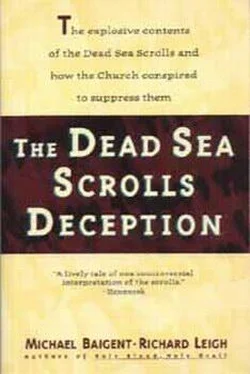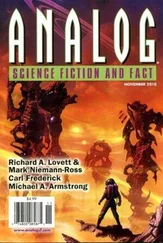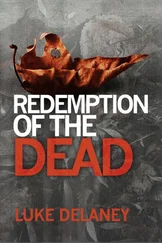Even today, Qumran feels remote, though several hundred people live in a nearby kibbutz and the place can be reached quickly and easily by a modern road running to Jerusalem — a drive of some twenty miles and forty minutes. Day and night, huge articulated lorries thunder along the road, which links Eilat in the extreme south of Israel with Tiberius in the north. Tourist buses stop regularly, disgorging sweating Western Europeans and Americans, who are guided briefly around the ruins, then to an air-conditioned bookshop and restaurant for coffee and cakes. There are, of course, numerous military vehicles. But one also sees private cars, both Israeli and Arab, with their different coloured number-plates. One even sees the occasional ‘boy racer’ in a loud, badly built Detroit monster, whose speed appears limited only by the width of the road.
The Israeli Army is, needless to say, constantly in sight. This, after all, is the West Bank, and the Jordanians are only a few miles away, across the Dead Sea. Patrols run day and night, cruising at five miles per hour, scrutinising everything — small lorries, usually, with three heavy machine-guns on the back, soldiers upright behind them. These patrols will stop to check the cars and ascertain the precise whereabouts of anyone exploring the area, or excavating on the cliffs or in the caves. The visitor quickly learns to wave, to make sure the troops see him and acknowledge his presence. It is dangerous to come upon them too suddenly, or to act in any fashion that might strike them as furtive or suspicious.
The kibbutz — Kibbutz Kalia — is a ten-minute walk from Qumran, up a short road from the ruins. There are two small schools for the local children, a large communal refectory and housing units resembling motels for overnight tourists. But this is still a military zone. The kibbutz is surrounded by barbed wire and locked at night. An armed patrol is always on duty, and there are numerous air-raid shelters deep underground. These double for other purposes as well. One, for example, is used as a lecture hall, another as a bar, a third as a discotheque. But the wastes beyond the perimeter remain untouched by any such modernity. Here the Bedouin still shepherd their camels and their goats, seemingly timeless figures linking the present with the past.
In 1947, when the Dead Sea Scrolls were discovered, Qumran was very different. At that time the area was part of the British mandate of Palestine. To the east lay what was then the kingdom of Transjordan. The road that runs south along the shore of the Dead Sea did not exist, extending only to the Dead Sea’s north-western quarter, a few miles from Jericho. Around and beyond it there were only rough tracks, one of which followed the course of an ancient Roman road. This route had long been in total disrepair. Qumran was thus rather more difficult to reach than it is today. The sole human presence in the vicinity would have been the Bedouin, herding their camels and goats during the winter and spring, when the desert, perhaps surprisingly, yielded both water and grass. In the winter, or possibly the early spring, of 1947, it was to yield something more — one of the two or three greatest archaeological discoveries of modern times.
The precise circumstances attending the discovery of the Dead Sea Scrolls have already passed into legend. In a number of particulars, this legend is probably not entirely accurate, and scholars were bickering over certain points well into the 1960s. It remains, however, the only account we have. The original discovery is ascribed to a shepherd boy, Muhammad adh-Dhib, or Muhammad the Wolf, a member of the Ta’amireh tribe of Bedouin. He himself later claimed he was searching for a lost goat. Whatever he was doing, his itinerary brought him clambering among the cliffs at Qumran, where he discovered an opening in the cliff-face. He tried to peer inside but, from where he stood, could see nothing. He then tossed a stone into the blackness, which elicited a sound of breaking pottery. This, needless to say, impelled him to further exploration.
Hoisting himself upwards, he crawled through the aperture, then dropped down to find himself in a small cave, high-ceilinged and narrow, no more than six feet wide and perhaps twenty-four long. It contained a number of large earthenware jars, about two feet tall and ten inches wide, many of them broken. Eight are generally believed to have been intact, though the quantity has never been definitively established.
According to his own account, Muhammad became frightened, hauled himself back out of the cave and fled. The next day, he returned with at least one friend and proceeded to explore the cave and its contents more closely. Some of the earthenware jars were sealed by large ‘bowl-like’ lids. Inside one of them, there were three leather rolls wrapped in decaying linen — the first of the Dead Sea Scrolls to see the light in nearly two thousand years. 1
During the days that followed, the Bedouin returned to the site and at least four more leather rolls were found. At least two jars were removed and used for carrying water. When proper archaeological excavation began, it revealed a substantial number of sherds and fragments — enough, according to reliable estimates, to have constituted no fewer than forty jars. There is no way of knowing how many of these jars, when first discovered, were empty and how many actually contained scrolls. Neither is there any way of knowing how many scrolls were taken from the cave and, before their significance became apparent, secreted away, destroyed or used for other purposes. Some, it has been suggested, were burned for fuel. In any case, we were told that more scrolls were taken from the cave than have previously been recorded, or than have subsequently come to light. Altogether, a total of seven complete scrolls were to find their way into the public domain, along with fragments of some twenty-one others.
At this point, accounts begin to grow increasingly contradictory. Apparently, however, thinking the scrolls might be of some value, three Bedouin took all they had found — three complete parchments according to some sources, seven or eight according to others — to a local sheik. He passed the Bedouin on to a Christian shopkeeper and dealer in curios and antiques, one Khalil Iskander Shahin, known as ‘Kando’. Kando, a member of the Syrian Jacobite Church, contacted another Church member residing in Jerusalem, George Isaiah. According to reliable scholars, Kando and Isaiah promptly ventured out to Qumran themselves and removed a number of additional scrolls and/or fragments. 2
Such activities were, of course, illegal. By the law of the British mandate — a law subsequently retained by both Jordanian and Israeli governments — all archaeological discoveries belonged officially to the state. They were supposed to be turned over to the Department of Antiquities, then housed in the Palestine Archaeological Museum, known as the Rockefeller, in Arab East Jerusalem. But Palestine was in turmoil at the time, and Jerusalem a city divided into Jewish, Arab and British sectors. In these circumstances, the authorities had more pressing matters to deal with than a black market in archaeological relics. In consequence, Kando and George Isaiah were free to pursue their clandestine transactions with impunity.
George Isaiah reported the discovery to his ecclesiastical leader, the Syrian Metropolitan (i.e. Archbishop) Athanasius Yeshua Samuel, head of the Syrian Jacobite Church in Jerusalem. Academically, Athanasius Yeshua Samuel was a naive man, untutored in the sophisticated scholarship needed to identify, much less translate, the text before him. The late Edmund Wilson, one of the earliest and most reliable commentators on the Qumran discovery, wrote of Samuel that he ‘was not a Hebrew scholar and could not make out what the manuscript was’. 3He even burned a small piece of it and smelled it, to verify that the substance was indeed leather, or parchment. But whatever his academic shortcomings, Samuel was also shrewd, and his monastery, St Mark’s, contained a famous collection of ancient documents. He thus had some idea of the importance of what had passed into his hands.
Читать дальше












